Is your cat using your bed for its pee and poo business? Does the odor and cleaning disgust you? It’s time for you to learn how to stop a cat from peeing on bed.
Feel like stretching on your bed and relaxing after a long day, only to find a puddle of stinky cat smell each time? As disgusting and irritating as it sounds, it is a matter of grave concern as to why is your cat peeing there and how to stop a cat from peeing on the bed?
We help you understand why your cat uses the bed for peeing with bright ideas on how to stop a cat from peeing on the bed.
Why Does A Cat Pee On The Bed?
Medical conditions or behavioral issues like anxiety or stress are the most common reasons for your cat peeing on the bed.
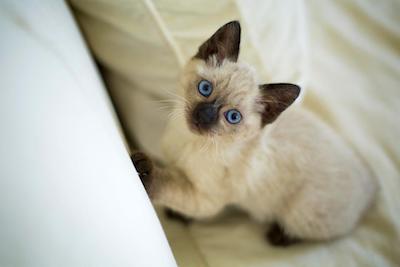
To make it simpler for you, we have listed out a few concerns you should be dealing with if your bed is your feline’s favorite spot to pee.
Medical Issues
if your cat is not urinating in the litter box and pees just anywhere in the house or on your bed, it can be due to medical problems.
They include bladder stone or bladder infection, idiopathic cystitis, or metabolic diseases which cause severe inflammation and an urge to urinate more often.
Check with your vet as it is best to rule out the chances of infection before assuming much.
Behavioral Issues
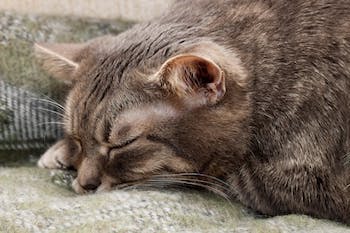
There are various reasons for your cat to pee on the bed due to underlying stress or anxiety. Stress or anxiety may be due to various factors like shifting to a new place, your cat does not feel safe or comfortable, introducing a new type of food, etc.
This usually causes hormonal and chemical imbalances and is medically referred to as idiopathic cystitis which is inflammation of the bladder with the cause not known.
These environmental and behavioral problems can be changed by bringing improvements in your cat’s surroundings and making them feel comfortable to reduce stress and anxiety.
How about getting the best cat beds that she will love?
A few environmental and related concerns include:
Litter Box Location
Your cat might be expecting a private surrounding for its shedding activities which is not possible due to the location of the litter box at home.
Maybe the litter box is placed in a busy or noisy location in the house, or maybe the zone is not very ventilated or cozy and relaxing.
It may also be so, that your cat spends most of its time in some other areas of the house and is too lazy to travel to the litter box.
More Cat Litter Boxes
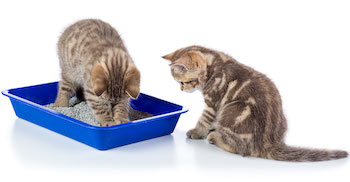
If you have a number of cats in your house, they may not want to always share the same litter space with other cats. It is advisable to have a separate litter box for each cat along with one extra box at your house.
It is definitely weird to have multiple litter boxes around the house but the cleaning is confined to a single place instead of having to clean your bedsheets.
Moreover, keeping the litter boxes accessible in multiple spots is better as cats are not trained to control their urges to urinate for a long time.
Is it the Litter or the Litter Box?
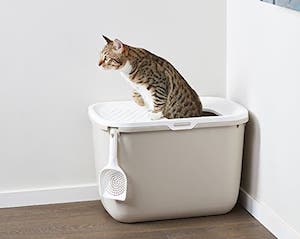
Probably it is the litter box that your cat is not comfortable with or the type of litter you are getting for your feline friend. The entry to the litter box may be too narrow or too small for your cat to feel comfortable.
Also, the texture of the litter you choose may be too harsh or too soft for your cat to dig your paws onto.
Remember to keep different types of litter and litter boxes if you have multiple cats who may have different preferences. The litter needs to be absorbent and smooth for digging for your cat to easily hide its sheddings as these habits are a part of their natural instincts.
Change in Environment
Your kitty may face anxiety and hormonal issues due to a change in physical surroundings or a minor change like a new member in the house, lack of care and attention, fear of staying alone for long hours which may cause them to micturate in unusual spots like your bed.
Safety and Security
Stress and anxiety that make them pee and shed in unexpected spots may be due to a lack of safety and comfort in your house. If you often scold your cat while he pees in an unlikely spot, they may end up developing a negative impact on themselves.
Moreover, they may also be stressed because they require something but cannot express it and hence, end up peeing due to anxiety.
Making them feel loved and secure, making sure they have food and water at their dispense at all times, and spending enough time with them is relaxing for your cat as well as for you.
Training them to use their own cat bed positively with love makes them feel less scared of you and causes them to obey your commands duly.
How To Stop a Cat From Peeing On Bed?
Ruling out medical problems, fixing their litter box, and keeping them distracted and away from the bed, while maintaining a stress-free environment are a few ways in which you can stop a cat from peeing on the bed.
We have listed a few ways out for you to try in order to stop your cat from peeing on the bed.
Consult The Vet
Before making any arrangements to stop your cat from peeing on the bed, we need to understand that it can be a genuine medical concern.
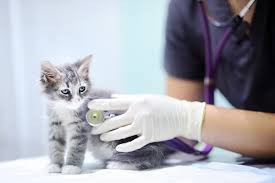
When cats suffer from bladder infections or inflammations, they are unable to stop their urges to pee and may require treatment and medical attention to stop the habit.
Hormonal imbalances due to stress and anxiety may also be the underlying cause for which a veterinarian can guide you.
Make Your Bed Pee Proof
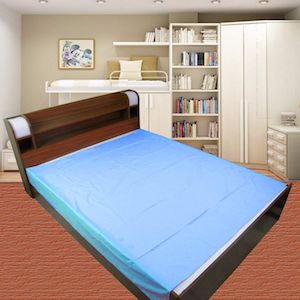
Use materials like plastic or aluminum foil which usually end up making a crinkly sound that cats deter from. Alternatively, you can also use mattress covers or shower curtains that would not allow your bed mattress to soak in cat pee and keep them protected.
It may look like a hassle at first but barely takes time to lay on the bed. It is definitely a lot better than having to see a wet bed at the end of the day.
Pheromone Diffuser
Pheromone diffusers are used to calm and relax your pet from anxiety or stress. Usually, behavioral and stress-related issues may cause your feline friend to pee, be it on the bed or anywhere in your house.
A pheromone relaxant will calm your kitty and reduce his urges of peeing, thereby, not causing your mattress to drench in cat urine anymore.
Maintain the Litter Box
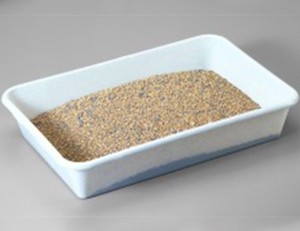
Your cat would simply avoid using the litter box because he is not comfortable using it. This could be due to odor and dirt that has not been cleaned for a long time or maybe the entry or location of the litter box may not suit your cat leading him to pee on your bed.
Make the area meant for their peeing a bit feline friendly and comfortable so that your cat does not have to move about places in the house including your bed, to pee and shed.
Cat Repellant
Citrus Cat Repellants are a great way to keep your cat away from your bed. This might mean you would not be inviting your cat to snuggle and cozy up with you.
However, it is worth the distance you have to maintain from your cat while sleeping rather than having a stinky bed the next moment.
Encourage Litter Box Use
If your cat does not pee in the desired place, move the litter box close to him. This means, placing multiple litter boxes at access around the house.
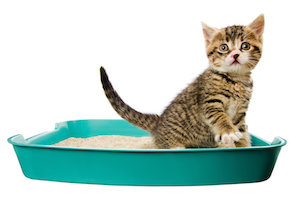
Keep the litter box close to the bed where he usually pees. This might encourage them to pee in the box slowly and eventually make it a habit. Keep it in a corner of the room as cats like to eliminate in peaceful and non-disturbing surroundings.
Training With Love
Is it possible to train your cat? Definitely yes. Giving them treats when they pee at the right spot, saying good words to them, and praising them will automatically help them reduce stress and anxiety-related issues of peeing.
Use Cat’s Belongings
Alternatively, cats are very careful about their personal belongings. They would not want to dirty the spot where their toys, accessories, and treats are placed.
You can try placing them on the bed, so your cat would not feel like dirtying the spot where his belongings are placed.
How to Clean Cat Urine From Your Bed?
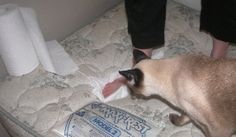
The best way to clean cat urine is by using mild enzymatic cleaners or natural cleansing agents to get rid of the germs and odor on the bed.
With the above suggestions taken into consideration, what happens if, at times, you find a wet spot on your bed or wake up to a disgusting stink at night. At such times, before it gets worse, dirtier, and stinkier to attract your cat again, act immediately.
You can use an enzyme-based detergent to clean the mess off the bed as enzymes help in breaking the acids present in cat urine. This helps in getting off the odor and also makes the surface germ free.
If you have run out of detergents, use baking soda and vinegar as a quick home remedy as these can be readily available at home and help in removing the icky scent.
Once done with immediate treatment using cleansing agents, give the bedsheet a good spin in the washing machine and allow it to dry well.
The best way to avoid all the hassle from happening again is to use a precautionary measure of laying a plastic or tarpaulin sheet over your bed for your cat to stay away from your zone.
Also Read: Are Heated Beds Safe for Cats?
FAQs
What smell keeps cats from peeing on the bed?
Strong odor of pepper, garlic, or lemon can keep your cat away from the bed. These smells are not usually liked by cats and if sprayed on the bed, will not encourage any activities like peeing on your bed.
Why does a cat pee on the same spot?
Cats may pee on the same spot if they have not been spayed or neutered which makes them mark their territory.
Once they use a particular area, it makes them want to pee at the same spot repeatedly due to the odor that attracts them.
How often should I change my cat’s litter?
Twice a week is the ideal recommended guideline for changing cat litter. As it tends to get dirty and clumpy more often due to cat pee and poop, it is recommended to change it once to twice per week.
Will vinegar stop my cat from peeing on the bed?
Vinegar makes an excellent cat repellant. Moreover, if your cat has peed on the bed or any surface, vinegar helps in cleaning surfaces as it reduces the stinky odor of the urine.
A dilute 3:1 (Water: Vinegar) solution can be used for cleaning and spraying on surfaces where your cat usually lingers.
Do cats pee on the bed when they are mad?
Cats do not exactly pee when they are mad but the reason can be due to underlying stress or anxiety that causes inflammations and hormonal imbalances in the body.
Keeping them feeling safe in a calm and relaxed environment will avoid them from peeing inappropriately on your bed.
Final Note
While it is a good idea to cozy up with your feline friend on your bed, having to bear the grunts of cleaning cat pee can be a pain. If your cat does it often, then it is worrisome as it can be due to a medical condition and you will have to show a vet at the earliest.
However, we can help our cats from not following this habit of using our beds with the measures suggested above.
Maintaining a stress-free relaxed environment, training them with love, and keeping their litter box and surroundings clean are a few ways in which you can have a pee-free bed. If your cat has peed on your bed by mistake, a detergent or repellant always works.
After all, your bed is not a spot to pee, but for you to sleep at peace!!

